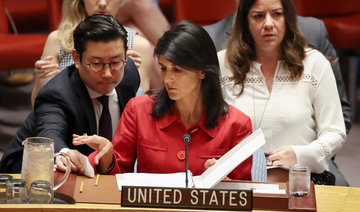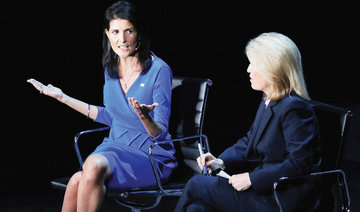WASHINGTON: In the US standoffs with North Korea and Iran, it is her striking phrases that dominate the headlines and the airwaves.
Nikki Haley, US ambassador to the UN, has become the voice of American foreign policy, all but eclipsing her discreet secretary of state, Rex Tillerson.
The 45-year-old former governor of South Carolina has risen quickly in American conservative politics, despite being the daughter of Indian Sikh immigrants.
And many here can now imagine her going further, perhaps replacing Tillerson, perhaps one day going as far as the White House itself.
Tillerson, the media-shy 65-year-old former boss of oil giant ExxonMobil, has given no indication that he plans to quit President Donald Trump’s administration any time soon.
But events of recent days have shown up the stark differences in style between the secretary and his younger cabinet colleague, triggering eager gossip in the corridors of power.
At the weekend North Korea detonated its sixth and most powerful nuclear test to date, as dictator Kim Jong-un’s defied Washington’s calls for him to enter disarmament talks.
On Sunday, Trump met with his top national security officials and afterwards Defense Secretary Jim Mattis warned that any attack from Pyongyang would meet a “massive military response.”
Tillerson, however, was spending the holiday weekend in his native Texas and only joined the conference by video link. He did not speak publicly on this major diplomatic challenge.
On Monday, Haley took to the floor of the UN Security Council to demand tougher sanctions and, as is often the case, she found the words that made it into world headlines.
Kim’s missile tests and nuclear threats show, she said, that the isolated young autocrat “is begging for war.”
By Tuesday, Tillerson was back in Washington but still keeping his customary low profile. The State Department held no press briefing that day, but Haley was in the capital for the day anyway.
At the conservative think tank the American Enterprise Institute (AEI), she took charge of another thorny diplomatic dossier, laying out a case for declaring Iran in breach of the 2015 nuclear deal.
Her hosts were delighted at the turnout — the hall was packed with reporters and policy experts — and at the uncompromising message.
“She has increasingly become, to many rogue nations around the world, the voice of America, and a strong and clear one at that,” declared Danielle Pletka, AEI vice president.
Not everyone in Washington agreed with Haley’s argument.
Many accused her of making false claims about Iran’s actions to justify Trump’s hostility to the nuclear accord, which six world powers signed with Iran under previous US President Barack Obama.
“I was no fan of Iran deal; but rarely have I heard a talk about Iran accord more misleading than one Nikki Haley gave today,” tweeted analyst Aaron David Miller, of the Wilson Center.
In contrast, Mark Dubowitz, of the hawkish Foundation for Defense of Democracies hailed Haley’s toughly worded intervention, as “as good a speech on the issue that you will ever hear (or read).”
Whether for or against her arguments, however, observers agreed that Haley has made a splash in the debate. Even a skeptical Miller dubbed her “de facto SecState and perhaps the next real one.”
Neither Haley nor Tillerson were diplomats before Trump’s election.
But — while the secretary brought international contacts and negotiating experience to the State Department — the ambassador brought the easy speaking style of a retail politician to the UN.
Tillerson has proved unwilling to engage with the media, kicking the traveling press pool off his plane and giving few interviews, while Haley dominates the UN’s global stage.
Recently, when Tillerson did agree to talk to a sympathetic Fox News, he distanced himself from Trump’s controversial stance on a neo-Nazi demonstration, sparking rumors he might resign.
But his defenders insist that, in his low-key way, he is quietly building a better and more useful power base than many of his predecessors and has no need of the limelight for now.
Former senior national security official Jim Jeffrey, who advised Tillerson at Exxon, cites the example of former Secretary of State Colin Powell, who served under president George W. Bush.
Powell, a former general and comfortable media performer, was well-liked by his State Department staff and respected abroad.
But his Cabinet rivals Vice President Dick Cheney and Defense Secretary Donald Rumsfeld had the president’s ear and America launched the 2003 Iraq invasion over Powell’s objections.
Jeffrey, a senior fellow at the Washington Institute, says Tillerson is building a relationship with his boss, while not overshadowing him, something that might stand him in good stead.
Wherever it leads, the next stage of the three-way drama will play out later this month when Trump, Tillerson and Haley attend the centerpiece of the diplomatic year, the UN General Assembly.
























